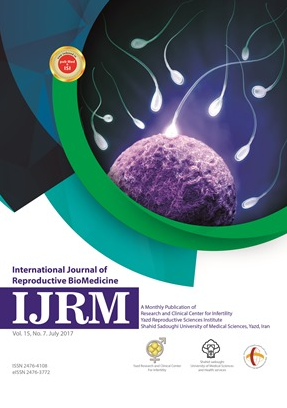
International Journal of Reproductive BioMedicine
ISSN: 2476-3772
The latest discoveries in all areas of reproduction and reproductive technology.
Effects of radioiodine therapy on fertility indicators among men with differentiated thyroid cancer: A cohort study
Published date:Jun 10 2023
Journal Title: International Journal of Reproductive BioMedicine
Issue title: International Journal of Reproductive BioMedicine (IJRM): Volume 21, Issue No. 5
Pages:387 - 394
Authors:
Abstract:
Background: Following thyroidectomy, radioiodine therapy is the standard management of differentiated thyroid cancer. The effects of such treatment on testicular function remained a concern for cases and clinicians.
Objective: We aimed to observe changes in fertility indicators in men treated with ablation.
Materials and Methods: In this prospective cohort study, 18 men with differentiated thyroid cancer from June to December 2020 underwent thyroidectomy plus radioiodine therapy. Participants were grouped based on iodine dose (8 men with 30 mCi vs. 10 men with ≥ 150 mCi). Baseline values (VB) of the follicular stimulating hormone, luteinizing hormone, testosterone, and sperm analyses were measured 3 wk before iodine ablation and repeated 3 (V3) and 12 (V12) months later. They were analyzed once as a whole and once based on their groups via ANOVA and Friedman’s tests where appropriate.
Results: The mean age of participants was 35.61 ± 9.74 yr. Follicular stimulating hormone levels showed a significant trend among all participants (VB: 12.51 ± 1.72, V3: 13.54 ± 1.41, and V12: 13.10 ± 1.67 IU/mL; p < 0.001). Luteinizing hormone showed a similar pattern (VB: 4.98 ± 1.27, V3: 5.65 ± 1.29, and V12: 5.21 ± 0.95 IU/mL; p < 0.001). Testosterone levels did not differ significantly from baseline. Sperm count decreased at the first checkpoint and returned to normal after 12 months (VB: 38.22 ± 19.40, V3: 32.05 ± 17.96, and V12: 36.66 ± 18.81 million/mL; p < 0.001). Sperm motility and morphology did not change significantly.
Conclusion: Our research showed that even less than 5 GBq irradiation could induce a transient testicular dysfunction in the first 3 months of therapy, but it was mostly reversible after 12 months.
Key words: Follicle-stimulating hormone, Iodine-131, Male infertility, Semen analyses.
References:
[1] National Cancer Institute. New research into thyroid cancer. 2021. Available at: https://www.cancer.org/cancer/thyroid-cancer/about/newresearch. html.
[2] National Cancer Institute. SEER stat fact sheets: Thyroid cancer. SEER cancer statistics review, 1975- 2018, National Cancer Institute. 2021. Available at: https://seer.cancer.gov/statfacts/html/thyro.html.
[3] Esquerre-Lamare C, Isus F, Moinard N, Bujan L. Sperm DNA fragmentation after radioiodine treatment for differentiated thyroid cancer. Basic Clin Androl 2015; 25: 8.
[4] Nies M, Arts EGJM, van Velsen EF, Burgerhof JGM, Kobold ACM, Corssmit EPM, et al. Long-term male fertility after treatment with radioactive iodine for differentiated thyroid carcinoma. Eur J Endocrinol 2021; 185: 775–782.
[5] van Velsen EFS, Visser WE, van den Berg SA, Kam BL, van Ginhoven TM, Massolt ET, et al. Longitudinal analysis of the effect of radioiodine therapy on ovarian reserve in females with differentiated thyroid cancer. Thyroid 2020; 30: 580– 587.
[6] Yaish I, Azem F, Gutfeld O, Silman Z, Serebro M, Sharon O, et al. A single radioactive iodine treatment has a deleterious effect on ovarian reserve in women with thyroid cancer: Results of a prospective pilot study. Thyroid 2018; 28: 522–527.
[7] Wichers M, Benz E, Palmedo H, Biersack HJ, Grunwald F, Klingmuller D. Testicular function after radioiodine therapy for thyroid carcinoma. Eur J Nucl Med 2000; 27: 503–507.
[8] Fard-Esfahani A, Emami-Ardekani A, Fallahi B, Fard- Esfahani P, Beiki D, Hassanzadeh-Rad A, et al. Adverse effects of radioactive iodine-131 treatment for differentiated thyroid carcinoma. Nucl Med Commun 2014; 35: 808–817.
[9] Canale D, Ceccarelli C, Caglieresi C, Moscatelli A, Gavioli S, Santini P, et al. Effects of radioiodine treatment for differentiated thyroid cancer on testis function. Clin Endocrinol 2015; 82: 295–299.
[10] Bourcigaux N, Rubino C, Berthaud I, Toubert ME, Donadille B, Leenhardt L, et al. Impact on testicular function of a single ablative activity of 3.7 GBq radioactive iodine for differentiated thyroid carcinoma. Hum Reprod 2018; 33: 1408–1416.
[11] Sayan M, Cassidy R, Butker EE, Nanda RH, Krishnamurti L, Khan MK, et al. Gonadal shielding technique to preserve fertility in male pediatric patients treated with total body irradiation for stem cell transplantation. Bone Marrow Transplant 2016; 51: 997–998.
[12] Rosario PW, Xavier ACM. Recombinant human thyroid stimulating hormone in thyroid remnant ablation with 1.1 GBq 131iodine in low-risk patients. Am J Clin Oncol 2012; 35: 101–104.
[13] Ambigapathy JS, Kamalanathan S, Sahoo J, Kumar R, Perumal NL. Effect of thyroxine replacement on leydig cell and sertoli cell function in men with hypothyroidism. Indian J Endocrinol Metab 2020; 24: 265–269.
[14] Alahmar A, Dutta S, Sengupta P. Thyroid hormones in male reproduction and infertility. Asian Pac J Reprod 2019; 8: 203–210.
[15] Zhang L, Huang Y, Zheng Y, Cai L, Wen J, Chen G. The effect of I-131 therapy on pregnancy outcomes after thyroidectomy in patients with differentiated thyroid carcinoma: A meta-analysis. Endocrine 2021; 73: 301–307.